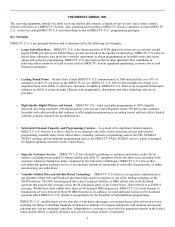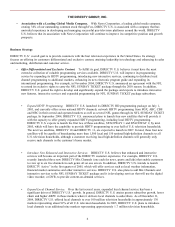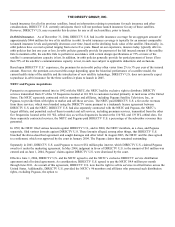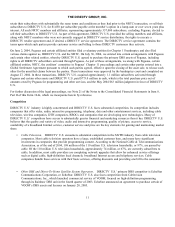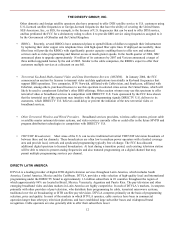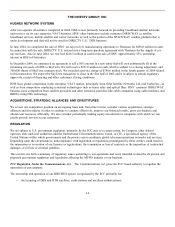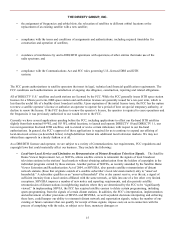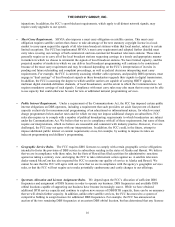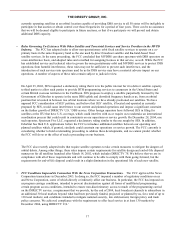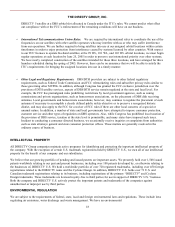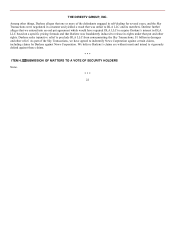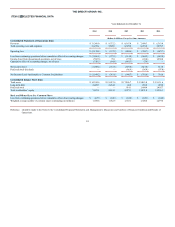DIRECTV 2004 Annual Report Download - page 24
Download and view the complete annual report
Please find page 24 of the 2004 DIRECTV annual report below. You can navigate through the pages in the report by either clicking on the pages listed below, or by using the keyword search tool below to find specific information within the annual report.
THE DIRECTV GROUP, INC.
•
the assignment of frequencies and orbital slots, the relocation of satellites to different orbital locations or the
replacement of an existing satellite with a new satellite;
•
compliance with the terms and conditions of assignments and authorizations, including required timetables for
construction and operation of satellites;
•
avoidance of interference by and to DBS/DTH operations with operations of other entities that make use of the
radio spectrum; and
•
compliance with the Communications Act and FCC rules governing U.S.-licensed DBS and DTH
systems.
The FCC grants authorizations to satellite operators that meet its legal, technical and financial qualification requirements. The
FCC conditions such authorizations on satisfaction of ongoing due diligence, construction, reporting and related obligations.
All of DIRECTV U.S.’ satellites and earth stations are licensed by the FCC. While the FCC generally issues DTH space station
licenses for a fifteen-year term, DBS space station and earth station licenses are generally issued for a ten-year term, which is
less than the useful life of a healthy direct broadcast satellite. Upon expiration of the initial license term, the FCC has the option
to renew a satellite operator’s license or authorize an operator to operate for a period of time on special temporary authority, or
decline to renew the license. If the FCC declines to renew the operator’s license, the operator is required to cease operations and
the frequencies it was previously authorized to use would revert to the FCC.
Currently we have several applications pending before the FCC, including applications to offset our Ka-band DTH satellites
slightly from their nominal 99 WL and 103 WL orbital locations, to launch and operate DIRECTV 10 and DIRECTV 11, our
two next-generation Ka-band DTH satellites, and to extend or waive certain milestones with respect to our Ka-band
authorizations. In general, the FCC’s approval of these applications is required for us to continue to expand our offering of
local-into-local service (as described below) in high-definition format into additional local television markets. We may not
obtain these approvals in a timely fashion or at all.
As a DBS/DTH licensee and operator, we are subject to a variety of Communications Act requirements, FCC regulations and
copyright laws that could materially affect our business. They include the following:
•
Local-into-Local Service and Limitation on Retransmission of Distant Broadcast Television Signals. The Satellite
Home Viewer Improvement Act, or SHVIA, allows satellite carriers to retransmit the signals of local broadcast
television stations in the stations’ local markets without obtaining authorization from the holders of copyrights in the
individual programs carried by those stations. Another portion of SHVIA, as recently amended by the Satellite Home
Viewer Extension and Reauthorization Act of 2004, or SHVERA, also permits satellite retransmission of distant
network stations (those that originate outside of a satellite subscriber’s local television market) only to “unserved
households.” A subscriber qualifies as an “unserved household” if he or she cannot receive, over the air, a signal of
sufficient intensity from a local station affiliated with the same network, or falls into one of a few other very limited
exceptions. SHVERA imposes a number of new notice and reporting requirements, and also permits satellite
retransmission of distant stations in neighboring markets where they are determined by the FCC to be “significantly
viewed.” In implementing SHVIA, the FCC has required satellite carriers to delete certain programming, including
sports programming, from the signals of certain distant stations. In addition, the FCC’s interpretation, implementation
and enforcement of other provisions of SHVIA and SHVERA, as well as judicial decisions interpreting and enforcing
these laws, could hamper our ability to retransmit distant network and superstation signals, reduce the number of our
existing or future customers that can qualify for receipt of these signals, impose costs on us in connection with the
process of complying with the rules, or subject us to fines, monetary damages or
15


